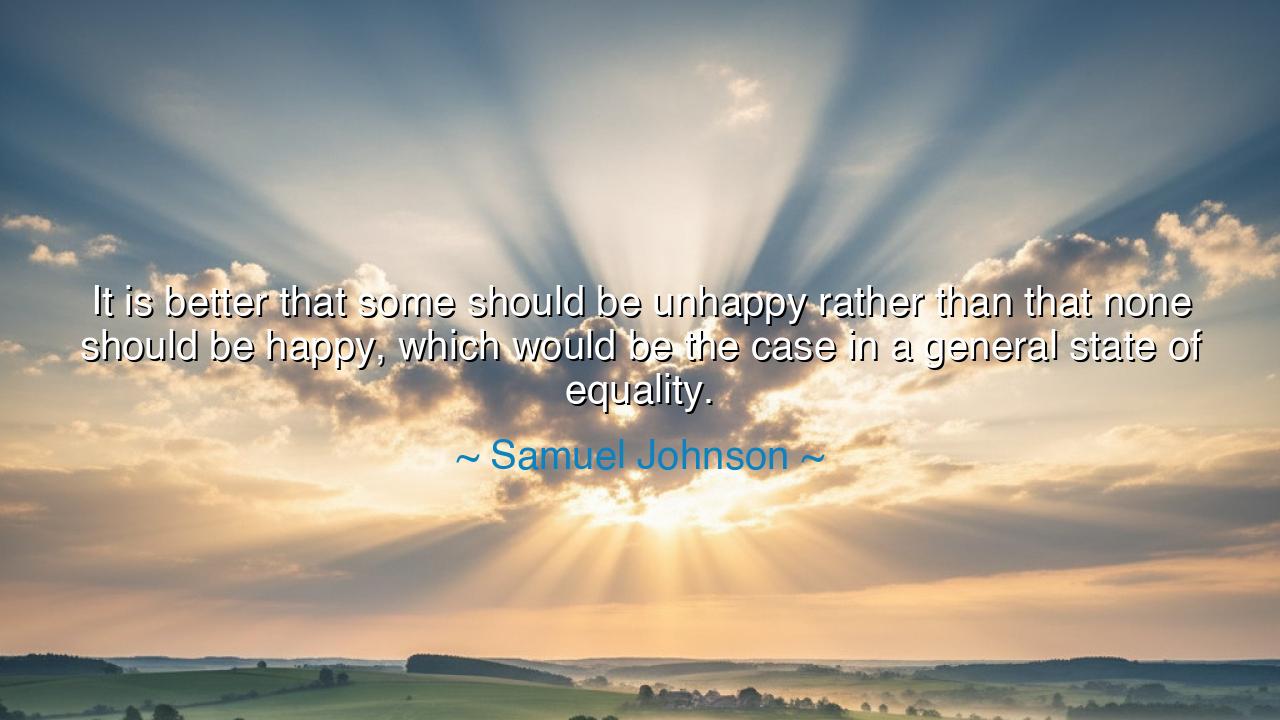
It is better that some should be unhappy rather than that none
It is better that some should be unhappy rather than that none should be happy, which would be the case in a general state of equality.






The words of Samuel Johnson—“It is better that some should be unhappy rather than that none should be happy, which would be the case in a general state of equality.”—speak with the gravity of a philosopher who understood the imperfection of the world and the limits of human idealism. Though they may seem harsh to the ear of the modern heart, they are born from a truth ancient and enduring: that absolute equality, while noble in vision, may destroy the very spark that gives rise to joy, creativity, and progress. Johnson, the great moralist of the eighteenth century, was no enemy of compassion—he was, rather, a student of nature and society, and in his wisdom he saw that the balance of life demands diversity in fortune and station.
The origin of this quote lies in Johnson’s reflections on the social order of his time—a world of kings and commoners, wealth and poverty, luxury and want. The age of revolution had not yet come, but the fires of equality already smoldered in the minds of thinkers. Johnson, though sympathetic to the sufferings of the poor, feared the illusions of radical equality. He believed that if every man were made equal in power, wealth, and condition, society would lose its very motion. For in such sameness, there would be no ambition, no striving, no excellence—only a dull and colorless uniformity. In his eyes, the inequality of circumstance was not cruelty, but the condition of vitality; for from struggle arises strength, and from difference, meaning.
To understand his words, we must first see them not as defense of injustice, but as acknowledgment of reality. Nature herself teaches this lesson: in the forest, not all trees grow to the same height; yet it is the towering oak that gives shelter to the weaker saplings, and the fallen leaves of the mighty feed the soil that nourishes all. The heavens, too, are unequal—some stars burn brighter, some fainter—yet together they form the vast beauty of the night. Johnson’s wisdom reminds us that happiness, like light, needs contrast to be seen. If all were equally blessed, none would recognize their blessings; if all were equally free from hardship, the virtue of endurance and the joy of triumph would cease to exist.
Consider the tale of Solon of Athens, the wise lawgiver who sought to bring balance to his city. He saw how the poor groaned under the weight of the rich, and how the rich feared the vengeance of the poor. When urged to make all men equal, he refused, saying that perfect equality breeds perfect envy, and that peace lies not in sameness but in fairness. Solon’s reforms did not abolish distinction but tempered it with justice—protecting the weak while preserving the strength of the capable. Thus Athens flourished, not as a land of identical men, but as a harmony of differences—a living testament to Johnson’s insight that some unhappiness must be borne for the happiness of all to endure.
Yet, we must not mistake Johnson’s meaning as license for oppression. He did not glorify misery nor justify greed. Rather, he warned that to force equality by erasing difference is to destroy the foundation of joy itself. If every artist painted the same, beauty would perish; if every voice sang the same note, music would die. In the same way, if every life were stripped of struggle and reward, humanity would sink into stagnation. The wise, therefore, do not seek equality in possessions or circumstances, but in dignity, opportunity, and compassion—that each soul may rise according to its strength and be honored for its effort.
The deeper truth of Johnson’s words lies in the humility they demand. The world will never be free of sorrow; it was not made to be perfect, but to be perfecting. Our task is not to abolish difference, but to ennoble it—to use strength to protect the weak, and to transform privilege into service. Those who have much must give much; those who have little must not despair. For in this exchange of giving and gratitude, of power and mercy, the highest form of equality is born—not of sameness, but of shared humanity.
And so, my child, remember this: seek justice, but not uniformity. Strive for compassion, not envy. Let not the dream of perfect equality blind you to the beauty of diversity. If fortune favors you, be generous; if hardship finds you, be resilient. The world is not a level plain, but a mountain range—each peak rising because of the valleys beneath. Do not curse the height of another, nor deny the worth of your own place upon the slope. For the joy of life is not in equality of measure, but in equality of spirit—in the understanding that though we are unequal in wealth or power, we are all equal in worth, and each carries within the power to bring light to another’s darkness.
Thus spoke Samuel Johnson, and thus shall the wise remember: it is better that some should be unhappy than that all should be empty. For happiness, like the flame, must burn upon the wood of difference, and only in its glow do we see the true colors of the human soul.






AAdministratorAdministrator
Welcome, honored guests. Please leave a comment, we will respond soon